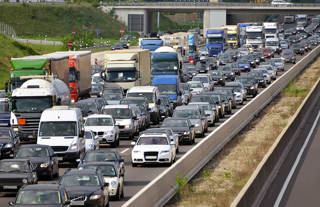Cities across England are adopting road layouts to provide more space for cycling and walking as coronavirus restrictions begin to be lifted.
The Government announced a £2 billion package over the weekend to encourage alternative ways to travel, with social distancing rules putting pressure on public transport as people return to work.
Pop-up bike lanes with protected space for cycling, wider pavements, safer junctions, and cycle and bus-only corridors will be created in England within weeks as part of a £250 million emergency active travel fund - the first stage of the £2 billion investment - it said.
Following unprecedented levels of walking and cycling across the UK during the pandemic, the Government says the plans will help encourage more people to choose alternatives to public transport when they need to travel, helping make sure the road, bus and rail networks are ready to respond to future increases in demand.
Greater Manchester, for example, wants to create 150 miles of protected cycle track, and Transport for London, which plans a ‘bike Tube’ network above underground lines.
Fast-tracked statutory guidance, which is effective immediately, tells councils to reallocate roadspace for significantly-increased numbers of cyclists and pedestrians.
In towns and cities, some streets could become bike and bus-only, while others remain available for motorists.
More side streets could be closed to through traffic, to create low-traffic neighbourhoods and reduce rat-running while maintaining access for vehicles.
Vouchers will be issued for cycle repairs, to encourage people to get their old bikes out of the shed, and plans are being developed for greater provision of bike fixing facilities.
Transport Secretary Grant Shapps says we need people to get on their bikes otherwise, with public transport’s capacity severely restricted at this time, “trains and buses could become overcrowded and our roads gridlocked.”
He continued: “We know cars will continue to remain vital for many, but as we look to the future we must build a better country with greener travel habits, cleaner air and healthier communities.”
Shapps also announced that e-scooter trials will also be brought forward from next year to next month to help encourage more people off public transport and onto greener alternatives.
Furthermore, an updated Cycling and Walking Investment Strategy will be launched by the Prime Minister in the summer, with further measures to transform cycling and walking to deliver the Government’s aims to double cycling and increase walking by 2025.
It will include: the creation of a national cycling and walking commissioner and inspectorate; higher standards for permanent infrastructure across England; getting GPs to prescribe cycling and exercise; and creating a long-term budget for cycling and walking similar to what happens for roads.
Impact on deliveries
Welcoming the move, RAC head of roads policy Nicholas Lyes said: “The success of new walking and cycling schemes will depend on how attitudes to using cars for short journeys have changed over recent weeks, and if those attitudes translate into people permanently switching to active forms of personal transport.
“It’s very likely that while traffic volumes are currently down, people will inevitably return to the comfort and convenience of their vehicles for some journeys when lockdown restrictions are eased, especially where they need to cover longer distances or have a longer commute.
“The needs of all road users must therefore be carefully considered. For example, authorities will need to be careful about reducing road space in certain areas as they could end up creating problems if traffic demand outweighs those opting to use a bike.”
Commercial fleet operators are particularly concerned how the on-street changes may affect their ability to deliver vital goods and services, and have called for night-time deliveries to continue.
ParcelHero says this time night deliveries should be made permanent once the crisis is over, to help cut urban congestion and pollution.
The severe restrictions previously in place on night-time deliveries to stores were relaxed on March 9, to enable shops to replenish shelves with groceries, hygiene products and other essentials.
As supply chains unravelled, the Government also relaxed competition laws to allow supermarkets to share staff, stock and delivery vans in local areas, to help keep stores open and deliveries happening.
ParcelHero says that as Britain begins to look towards lifting lockdown, retailer collaboration and night-time deliveries must not be allowed to disappear overnight, as they did once before, following their successful introduction during the London Olympics in 2012.
For more on this story, see the May edition of Fleet News and Commercial Fleet.























Edward Handley - 11/05/2020 15:13
The increase in cycling over the lock down period is hardly surprising - there was a massive fall in the number of cars on the roads making it safer and more comfortable for cyclists, the weather was unusually fine and dry, and we were told it was ok to go for a bike ride for exercise. When the lock down ends and we all get back to work the vast majority of the bikes will be stuffed back in the shed, not because people don't like cycling, but because our commute to work is long and just takes too long on a bicycle, even if the weather is wonderful. The fact is that we travel much further to work than most countries in Europe because moving house in the UK is a slow, expensive and unnecessarily complicated process, especially for a home owner, but even for renters as landlords demand massive deposits up front and getting your deposit back from the previous landlord often takes a considerable time. The Government make it worse by taxing house sales through stamp duty and vat on agents fees helping to make us a very immobile population. And lets not even start on the problems with getting the kids into a new school or getting onto a GP's list! As we are immobile, we commute, where the French, for example, who traditionally rent would just move to another apartment. Whatever calls the Government make and however much money they pour into "alternative travel" schemes, we will still opt for the comfort and convenience of our cars, and whenever interesting viruses are about we will follow the Prime Minister's advice and avoid public transport and use our cars with aircon and hepa filters instead. Throwing money at the problem is not going to work because the Government, and sadly, most of the environmentalist activists, don't actually understand what the problem is! Its not that we are too lazy to cycle, we just respond logically to the circumstances.